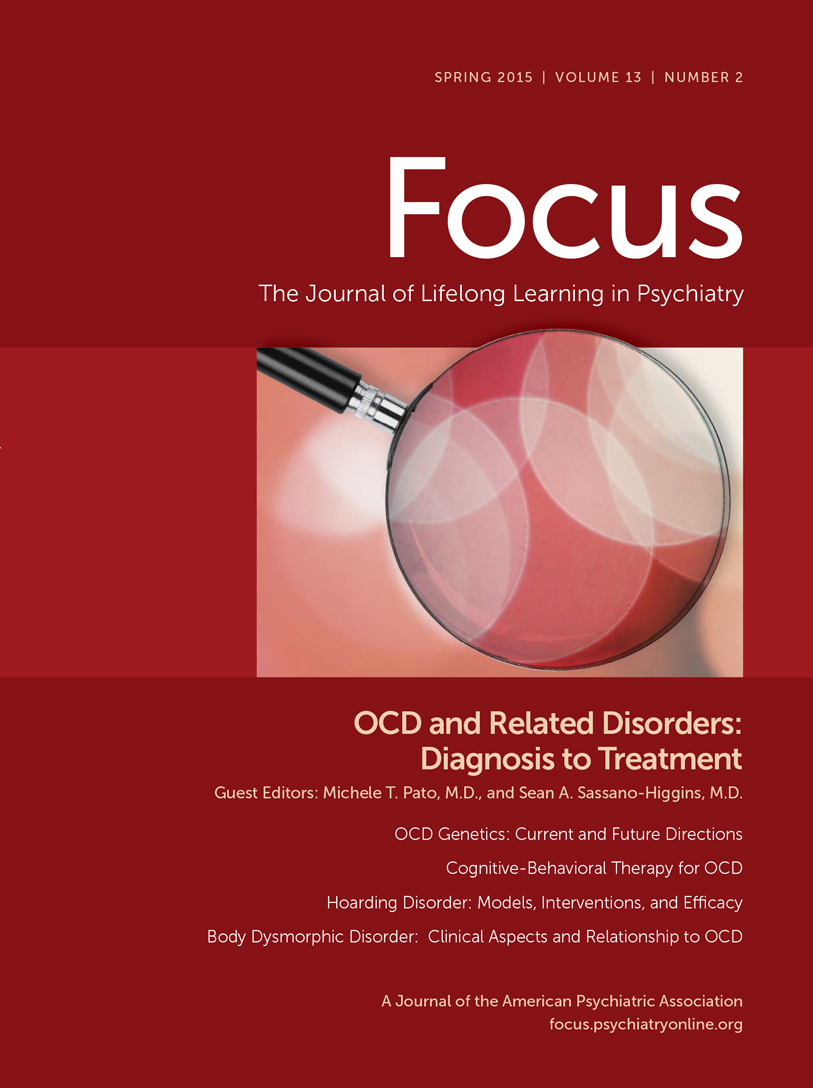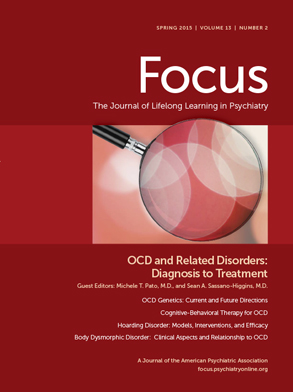Genome-Wide Association Study in Obsessive-Compulsive Disorder: Results From the OCGAS
Mattheisen M, Samuels JF, Wang Y, Greenberg BD, Fyer AJ, McCracken JT, Geller DA, Murphy DL, Knowles JA, Grados MA, Riddle MA, Rasmussen SA, McLaughlin NC, Nurmi EL, Askland KD, Qin HD, Cullen BA, Piacentini J, Pauls DL, Bienvenu OJ, Stewart SE, Liang KY, Goes FS, Maher B, Pulver AE, Shugart YY, Valle D, Lange C, Nestadt G.
Mol Psychiatry 2015; 20:337–344
Obsessive-compulsive disorder (OCD) is a psychiatric condition characterized by intrusive thoughts and urges and repetitive, intentional behaviors that cause significant distress and impair functioning. The OCD Collaborative Genetics Association Study (OCGAS) is comprised of comprehensively assessed OCD patients with an early age of OCD onset. After application of a stringent quality control protocol, a total of 1065 families (containing 1406 patients with OCD), combined with population-based samples (resulting in a total sample of 5061 individuals), were studied. An integrative analyses pipeline was utilized, involving association testing at single-nucleotide polymorphism (SNP) and gene levels (via a hybrid approach that allowed for combined analyses of the family- and population-based data). The smallest p value was observed for a marker on chromosome 9 (near PTPRD, p=4.13×10−7). Presynaptic PTPRD promotes the differentiation of glutamatergic synapses and interacts with SLITRK3. Together, both proteins selectively regulate the development of inhibitory GABAergic synapses. Although no SNPs were identified as associated with OCD at genome-wide significance level, follow-up analyses of genome-wide association study (GWAS) signals from a previously published OCD study identified significant enrichment (p=0.0176). Secondary analyses of high-confidence interaction partners of DLGAP1 and GRIK2 (both showing evidence for association in our follow-up and the original GWAS study) revealed a trend of association (p=0.075) for a set of genes such as NEUROD6, SV2A, GRIA4, SLC1A2 and PTPRD. Analyses at the gene level revealed association of IQCK and C16orf88 (both p<1×10−6, experiment-wide significant), as well as OFCC1 (p=6.29×10−5). The suggestive findings in this study await replication in larger samples.
Atypical Antipsychotic Augmentation in SSRI Treatment Refractory Obsessive-Compulsive Disorder: A Systematic Review and Meta-Analysis
Veale D, Miles S, Smallcombe N, Ghezai H, Goldacre B, Hodsoll J.
BMC Psychiatry 2014; 14:317
Background: In 2006, the National Institute of Clinical and Health Excellence (NICE) guidelines for Obsessive Compulsive Disorder (OCD) recommended antipsychotics as a class for SSRI treatment resistant OCD. The article aims to systematically review and conduct a meta-analysis on the clinical effectiveness of atypical antipsychotics augmenting an SSRI. Methods: Studies that were double-blind randomized controlled trials of an atypical antipsychotic against a placebo, for a minimum of 4 weeks, in adults with OCD, were included. Yale-Brown Obsessive Compulsive Scale (Y-BOCS) scores were the primary outcome measure. Inclusion criteria included Y-BOCS score of 16 or more and at least one adequate trial of a SSRI or clomipramine for at least 8 weeks prior to randomization. Data sources included Medline, Embase, PsycINFO, Cochrane Database of Systematic Reviews (CDSR), trial registries and pharmaceutical databases and manufacturers up to September 2013. Forest-plots were drawn to display differences between drug and placebo on the Y-BOCS. Results: Two studies found aripiprazole to be effective in the short-term. There was a small effect-size for risperidone or antipsychotics in general in the short-term. We found no evidence for the effectiveness of quetiapine or olanzapine in comparison to placebo. Conclusions: Risperidone and aripiprazole can be used cautiously at a low dose as an augmentation agent in nonresponders to SSRIs and CBT but should be monitored at 4 weeks to determine efficacy.
Pharmacotherapy of Obsessive-Compulsive Disorder: Evidence-Based Treatment and Beyond
Fineberg NA, Reghunandanan S, Brown A, Pampaloni I.
Aust N Z J Psychiatry 2013; 47:121–141
Background: Obsessive-compulsive disorder (OCD) is a neuropsychiatric disorder associated with a significant degree of functional disability and poor quality of life. Pharmacotherapy may have a substantial impact on the course and outcome of OCD. Method: We review the evidence supporting available strategies for the pharmacological treatment of OCD. Results: Selective serotonin reuptake inhibitors (SSRIs) remain the pharmacological treatment of choice and are associated with improved health-related quality of life. Discontinuation is associated with relapse and loss of quality of life, implying treatment should continue long-term. A substantial minority of patients who fail to respond to SSRI may benefit from dose elevation or adjunctive antipsychotics, though long-term trials validating the effectiveness and tolerability of these strategies are relatively lacking. Conclusion: The pharmacological evidence-base for the treatment of OCD is becoming increasingly robust. Treatment with SSRIs and clomipramine remains uncontroversial and improvements are sustained over time. Newer compounds targeting serotonin receptor subtypes and other neurotransmitter systems are undergoing evaluation.
Disruption in the Balance Between Goal-Directed Behavior and Habit Learning in Obsessive-Compulsive Disorder
Gillan CM, Papmeyer M, Morein-Zamir S, Sahakian BJ, Fineberg NA, Robbins TW, de Wit S.
Am J Psychiatry 2011; 168:718–726
Objective: Obsessive-compulsive disorder (OCD) is characterized by repetitive, ritualistic behaviors and thought patterns. Although patients with OCD report that these compulsive behaviors are unproductive and often senseless, they are unable to desist. This study investigated whether the urge to perform compulsive acts is mediated by a disruption in the balance between flexible, goal-directed action control and habitual behavior. Method: A total of 21 patients with OCD and 30 healthy comparison subjects participated in a set of tasks designed to assess relative goal-directed versus habitual behavioral control. In the training stage, participants were asked to respond to different pictured stimuli in order to gain rewarding outcomes. In the subsequent (instructed) outcome devaluation test and in a novel “slips-of-action” test, the authors assessed whether participants were able to flexibly adjust their behavior to changes in the desirability of the outcomes. The authors also used a questionnaire to test explicit knowledge of the relationships between stimuli, responses, and outcomes. Results: Patients with OCD showed no deficit in their ability to use feedback to respond appropriately to stimuli in the training stage. However, their knowledge of the outcomes of these responses was impaired relative to healthy comparison subjects, and patients were more prone to slips of action, indicating a deficit in goal-directed control and an overreliance on habits. Conclusions: This study provides the first experimental evidence for selective impairment in flexible and goal-directed behavioral control in patients with OCD. The impairment forces patients with OCD to rely instead on habits that can be triggered by stimuli regardless of the desirability of the consequences. Goal-directed actions are supported by orbitofronto-striatal circuitry, and the study findings are thus in line with findings from research that implicate dysfunction in this circuitry in the neuropathology of OCD.
Meta-Analysis of the Dose-Response Relationship of SSRI in Obsessive-Compulsive Disorder
Bloch MH, McGuire J, Landeros-Weisenberger A, Leckman JF, Pittenger C.
Mol Psychiatry 2010; 15:850–855
We sought to determine differences in efficacy and tolerability between different doses of selective serotonin reuptake inhibitors in the treatment of obsessive-compulsive disorder (OCD) using meta-analysis. We identified 9 studies involving 2268 subjects that were randomized, double-blind placebo-controlled clinical trials that compared multiple, fixed-doses of selective serotonin reuptake inhibitors (SSRIs) to each other and to placebo in the treatment of adults with OCD. Change in Y-BOCS score, proportion of treatment responders, and dropouts (all-cause and due to side-effects) were determined for each included study. Weighted mean difference was used to examine mean change in Y-BOCS score. Pooled absolute risk difference was used to examine dichotomous outcomes. Meta-analysis was performed using a fixed effects model in RevMan 4.2.8. We found that compared with either low or medium doses, higher doses of SSRIs were associated with improved treatment efficacy, using either Y-BOCS score or proportion of treatment responders as an outcome. Dose of SSRIs was not associated with the number of all-cause dropouts. Higher doses of SSRIs were associated with significantly higher proportion of dropouts due to side-effects. These results suggest that higher doses of SSRIs are associated with greater efficacy in the treatment of OCD. This SSRI efficacy pattern stands in contrast to other psychiatric disorders like Major Depressive Disorder. This greater treatment efficacy is somewhat counterbalanced by the greater side-effect burden with higher doses of SSRIs. At present, there are insufficient data to generalize these findings to children or adolescents with OCD.
Deep Brain Stimulation of the Ventral Internal Capsule/Ventral Striatum for Obsessive-Compulsive Disorder: Worldwide Experience
Greenberg BD, Gabriels LA, Malone DA Jr, Rezai AR, Friehs GM, Okun MS, Shapira NA, Foote KD, Cosyns PR, Kubu CS, Malloy PF, Salloway SP, Giftakis JE, Rise MT, Machado AG, Baker KB, Stypulkowski PH, Goodman WK, Rasmussen SA, Nuttin BJ.
Mol Psychiatry 2010; 15:64–79
Psychiatric neurosurgery teams in the United States and Europe have studied deep brain stimulation (DBS) of the ventral anterior limb of the internal capsule and adjacent ventral striatum (VC/VS) for severe and highly treatment-resistant obsessive-compulsive disorder. Four groups have collaborated most closely, in small-scale studies, over the past 8 years. First to begin was Leuven/Antwerp, followed by Butler Hospital/Brown Medical School, the Cleveland Clinic and most recently the University of Florida. These centers used comparable patient selection criteria and surgical targeting. Targeting, but not selection, evolved during this period. Here, we present combined long-term results of those studies, which reveal clinically significant symptom reductions and functional improvement in about two-thirds of patients. DBS was well tolerated overall and adverse effects were overwhelmingly transient. Results generally improved for patients implanted more recently, suggesting a 'learning curve' both within and across centers. This is well known from the development of DBS for movement disorders. The main factor accounting for these gains appears to be the refinement of the implantation site. Initially, an anterior-posterior location based on anterior capsulotomy lesions was used. In an attempt to improve results, more posterior sites were investigated resulting in the current target, at the junction of the anterior capsule, anterior commissure and posterior ventral striatum. Clinical results suggest that neural networks relevant to therapeutic improvement might be modulated more effectively at a more posterior target. Taken together, these data show that the procedure can be successfully implemented by dedicated interdisciplinary teams, and support its therapeutic promise.
A Randomized, Controlled Trial of Cognitive-Behavioral Therapy for Augmenting Pharmacotherapy in Obsessive-Compulsive Disorder
Simpson HB, Foa EB, Liebowitz MR, Ledley DR, Huppert JD, Cahill S, Vermes D, Schmidt AB, Hembree E, Franklin M, Campeas R, Hahn CG, Petkova E.
Am J Psychiatry 2008; 165:621–630
Objective: Although serotonin reuptake inhibitors (SRIs) are approved for the treatment of obsessive-compulsive disorder (OCD), most OCD patients who have received an adequate SRI trial continue to have clinically significant OCD symptoms. The purpose of this study was to examine the effects of augmenting SRIs with exposure and ritual prevention, an established cognitive-behavioral therapy (CBT) for OCD. Method: A randomized, controlled trial was conducted at two academic outpatient clinics to compare the effects of augmenting SRIs with exposure and ritual prevention versus stress management training, another form of CBT. Participants were adult outpatients (N=108) with primary OCD and a Yale-Brown Obsessive Compulsive Scale total score > or =16 despite a therapeutic SRI dose for at least 12 weeks prior to entry. Participants received 17 sessions of CBT (either exposure and ritual prevention or stress management training) twice a week while continuing SRI pharmacotherapy. Results: Exposure and ritual prevention was superior to stress management training in reducing OCD symptoms. At week 8, significantly more patients receiving exposure and ritual prevention than patients receiving stress management training had a decrease in symptom severity of at least 25% (based on Yale-Brown Obsessive Compulsive Scale scores) and achieved minimal symptoms (defined as a Yale-Brown Obsessive Compulsive Scale score < or =12). Conclusions: Augmentation of SRI pharmacotherapy with exposure and ritual prevention is an effective strategy for reducing OCD symptoms. However, 17 sessions were not sufficient to help most of these patients achieve minimal symptoms.

